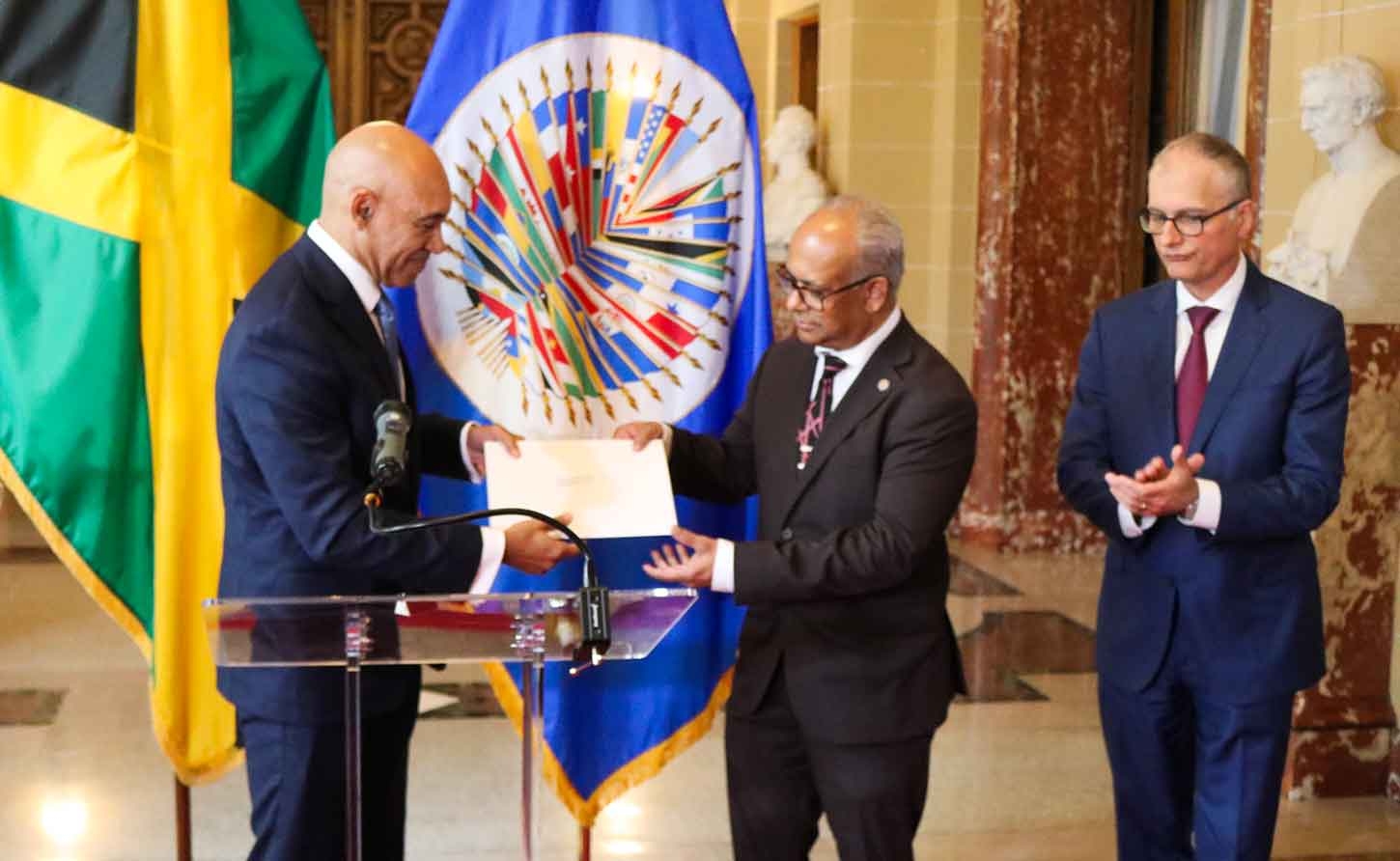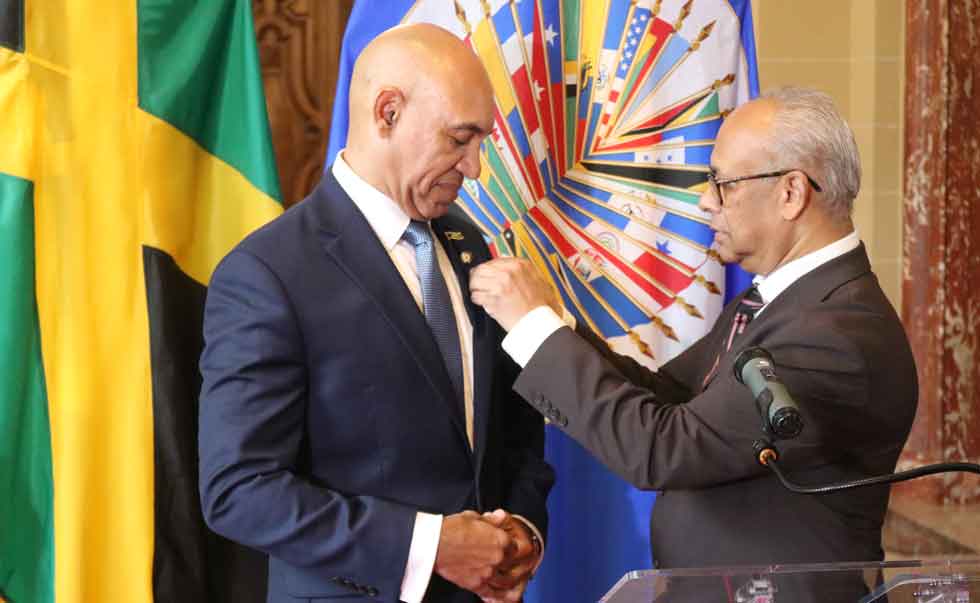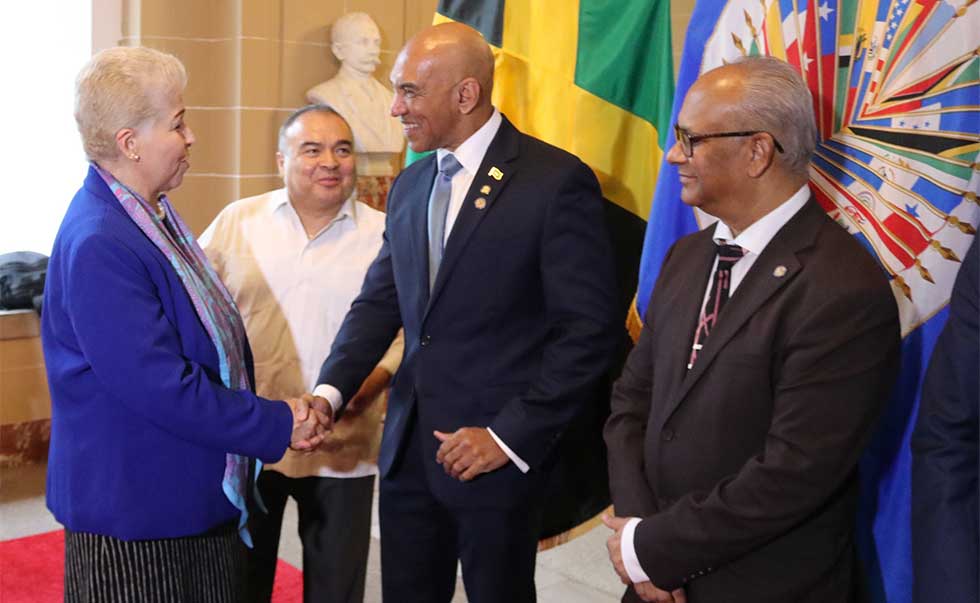UNITED STATES | Jamaica's New Ambassador Anthony Anderson Takes on Caribbean's Mounting Crisis

WASHINGTON, DC, June 19, 2025 - In a region where murder rates have soared to alarming heights and gun violence threatens democratic processes, Jamaica's choice of ambassador speaks volumes about its priorities.
When Major General (Ret'd) Antony Anderson presented his credentials Wednesday as Jamaica's new Permanent Representative to the Organization of American States, it wasn't just another ceremonial handshake in Washington's diplomatic corridors—it was a declaration of intent from a country that has had enough of talking while the Caribbean burns.
Anderson's appointment comes at a moment of reckoning for the OAS, an organization increasingly criticized for its ineffectiveness in addressing the hemisphere's most pressing crises. Just last month, U.S. Secretary of State Marco Rubio delivered a stinging rebuke: "Why do we have an OAS if the OAS can't put together a mission to handle the most critical region in our hemisphere?" The target of his frustration? Haiti, where criminal gangs have essentially captured the state while the OAS watches from the sidelines.
Enter Anderson, a man whose entire career has been forged in the crucible of Caribbean security challenges. The former chief of defense staff and later police commissioner, brings more than ceremonial gravitas to his new role—he brings a track record of results in a region where violence has become the norm rather than the exception.
Jamaica's own statistics tell a sobering story: 1,039 homicides by November 2024, with approximately 70% of violence involving illegal firearms predominantly smuggled from the United States. Yet Anderson's tenure as police commissioner saw significant progress, including a reported 56% reduction in active criminal organizations and a 14.5% decline in murder rates during the first half of 2024 compared to the previous year.

The timing of Anderson's appointment couldn't be more strategic. The Caribbean has become the terminus of what activists call an "iron river" of illegal firearms flowing from the United States, with countries like Jamaica recording 52.9 homicides per 100,000 inhabitants, while St. Lucia reached 42.3.
The cruel irony is unmistakable: Caribbean nations desperately depend on American tourists for their lucrative tourism industries while simultaneously being ravaged by American weapons.
Despite repeated pleas from Caribbean governments for U.S. gun manufacturers to help stem this deadly flow, the easy availability of American firearms continues to transform paradise islands into killing fields, threatening the very tourism lifeline these nations depend upon.
OAS Secretary General Albert Ramdin's welcoming remarks revealed both hope and desperation. "Jamaica has always played a vital role in amplifying the concerns of small island developing states, especially on issues of security, sustainable development and climate resilience," he noted, perhaps recognizing that small states require advocates with both moral authority and operational experience.
Anderson's credentials extend far beyond the typical diplomatic resume. With a Master of Defence Administration from the Royal Military College of Science and extensive experience facilitating joint security initiatives across the Caribbean, he represents a new breed of diplomat—one equally comfortable in war rooms and embassy ballrooms.
The OAS has faced mounting criticism for its response to regional crises, particularly its handling of Haiti's descent into chaos. The recent U.S. challenge to "build a mission of partners to confront" the Caribbean's most critical region underscores the growing frustration with an organization that many see as out of touch with ground realities.
Jamaica's decision to deploy Anderson signals a shift from diplomatic niceties to hard-nosed pragmatism. "This isn't about a rigid plan. It's about representing Jamaica's interests, staying flexible, and building relationships that matter," Anderson recently stated, words that could serve as a manifesto for a more action-oriented OAS.
The Caribbean's security landscape has deteriorated dramatically as a direct result of American firearms flooding the region. The proliferation of U.S.-sourced weapons, combined with narcotrafficking routes, has created a climate where governments risk being "co-opted by criminal organizations or collapse, unable to control the growing spiral of violence".

For small island developing states with limited resources, the burden of protecting both their citizens and American visitors from American weapons has become an unsustainable strain.
Anderson's mandate extends beyond traditional diplomacy. His expertise in addressing firearms trafficking, cybersecurity, and regional security frameworks positions him to tackle challenges that require operational knowledge, not just political finesse.
In a region where gun violence has spread geographically and over 875,000 people in Trinidad and Tobago alone are exposed to armed violence, abstract policy discussions ring hollow. The stakes are particularly high for Caribbean tourism economies that must somehow market themselves as safe havens to the very Americans whose country's weapons policies fuel the violence that threatens visitor safety.
The general-turned-diplomat faces the challenge of revitalizing an organization that has struggled to maintain relevance amid cascading crises. Jamaica's 56-year membership in the OAS, dating back to 1969, provides Anderson with both institutional memory and the credibility to push for meaningful reform.
As Anderson settles into his role at OAS headquarters, he carries with him not just Jamaica's diplomatic hopes but the expectations of a region that can no longer afford the luxury of ineffective multilateralism.
Whether the OAS can transform from a talking shop into an action-oriented security partner may well depend on whether voices like Anderson's can cut through the diplomatic static and demand results over rhetoric.
In a hemisphere where democratic institutions face existential threats from heavily armed criminal organizations wielding American weapons, Jamaica's choice to send a security expert rather than a career diplomat sends an unmistakable message: the time for business as usual is over.
-30-
